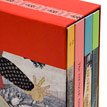| William Corbett |
Three Great Talkers |
I have known three epic talkers: Charles Olson, Philip Guston and Robert
Creeley. (Had I known Ted Berrigan better he might have made a fourth.)
I was in my mid-twenties when I knew Olson and had never met a person
of such conversational force, like a waterfall or blizzard. Conversational
is
the totally wrong word for our relationship. There were those who conversed
with Olson, but I was rarely one of them. He held court and I listened,
awed by the leaps, twists and turns of his monologues. I could not
always or, truth be told, often follow his references to mathematics,
mythology,
anthropology or Gloucester, Massachusetts history and geography. He
delivered these in fragments as if his mind was on to a second or third
thought before the first one had fully emerged. When he caught himself
with too many incomplete thoughts in the air he laughed, shaking his
head
at the maze he’d gotten into but he moved on. It was exhilarating
talk,
exhilarating to be in the presence of someone for whom so much mattered,
but had I taped Olson this may not come across today. Years after his
death
a tape surfaced of the legendary Bloomsbury talker, raconteur and wit
Desmond McCarthy. A generation who had long heard of his prowess was
all ears to experience it for themselves only to shrug, nonplused. You
had to
be there or McCarthy’s talk, like Johnson’s, needed a Boswell
to help it travel.
Olson left interviews, several recorded talks and some appearances on
film. His reading of his poem “The Librarian” for WNET Television
in, I
think, 1966 captures his vitality and entertaining hamminess.
Guston and I did converse, on more than one occasion all night, from
dinner through wine or beer for me, scotch and milk for him, several
packs
of Camel cigarettes, snacks to daybreak, breakfast and off to teach.
He did
need to be listened to, but he enjoyed the give and take of argument.
And
maddeningly, because he was a chronic doubter, he liked to argue with
himself. The evening might begin with his taking one side of a question
and arguing it with such lucidity and force that if you needed to be
convinced,
you were. But the worm of doubt was alive in his argument and
soon he argued against himself—this is why Dore Ashton titled her
book
on Guston Yes, but…—until the merits of both sides were
so clear it was
impossible to embrace either one. Guston hated resolution. The concept
of
closure now in vogue would have driven him nuts. He liked a permanent
tug-of-war, a frustrating chaos that he could achieve provisional treaties
with in his studio. Often we became so straitjacketed in both sides there
was no exit but laughter.
I knew Bob Creeley for thirty-eight years, far longer and more intimately
than I knew Olson or Guston. Where they were old enough to be my father,
Bob was an older brother. Before I met him I had read and
reread his poetry and admired his craft, commitment and way of being
a
poet. He was someone I wanted to befriend and be accepted by.
Accomplishing this could not have been easier. From the start, a dinner
in
Cambridge’s Chez Dreyfus, certainly the poshest restaurant Bob
and I ever
dined in, we hit it off. Soon he either came for lunch or dinner or stayed
with us when in Boston to read and I became initiated into the talk sessions
he seemed to thrive on.
—
WILLIAM CORBETT is a poet living in Boston’s South End and teaching
at MIT.
Among his books are Philip Guston’s Late Work: A Memoir. He has
edited The
Letters of James Schuyler to Frank O’Hara.
For the complete article purchase The
Sienese Shredder #1
Back to The Sienese Shredder #1
| 

